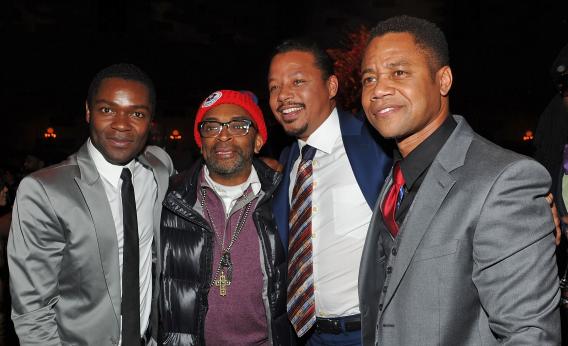Is It My Duty To See Red Tails?

Photo by Mike Coppola/Getty Images
In a recent New York Times Magazine profile by Slate columnist Bryan Curtis, George Lucas says of Red Tails, the new movie about the Tuskegee airmen that he financed himself: “If we can get over $20 million in our first weekend, we’re kind of in the game. We’re in The Help category.” In fact, Red Tails finished in second place over the weekend, with what Box Office Mojo described as “a very respectable $19.1 million.”
So close. And for me, that gap inspired just a hint of regret (but zero surprise). Like clockwork, I hear the murmur of “moral obligation” emanating from my superego each time I see a trailer for the latest mainstream film featuring a predominantly—or even moderately—black cast. Red Tails. The Help. Precious. I usually ignore it (at least until the film comes out on DVD).
Most of the time, that murmur is made audible by a few over-enthusiastic brethren who may (cough, Oprah, cough) or may not have a vested financial interest in a film’s success. Every once in awhile, though, it’s someone else—someone like George Lucas, for instance, the embodiment of cinematic gold, who has been rallying the people to prove to his ignorant counterparts that black audiences aren’t unicorns, as he did to much acclaim on The Daily Show a couple of weeks ago:
Like many people I know, I was initially impressed by Lucas’s admission that the business of Hollywood is still, in many ways, systematically racist. (Not everyone was so taken.) His description of the movie he had just produced also made me excited to see it: Red Tails sounded like a mix of classic WWII movies and Indiana Jones with the added bonus of portraying bona fide, real-life heroes.
But a smart piece by Charing Ball prompted me to reconsider the impression Lucas had made. Ball attempts to dispel the myth that a single film of questionable artistic merit can make or break the state of black cinema today. And she questions why an indie film like Pariah, with its rare storyline surrounding a black teenage lesbian, does not prompt similar activism among black moviegoers.
Part of the problem, of course, is that Pariah is being shown only in limited release. But it’s precisely such small films that are likely to benefit from mobilizing a community of viewers. If the same people who are riled up to see Lucas’s movie did the same for, say, The Interrupters, their energy might be more effective.
Ball’s post also raises one of the key questions when it comes to moviegoing activism: How important is the quality of the film? When you belong to a “niche” audience, Hollywood throws you a bone here and there—and you’re often expected to embrace it and be content with the promise that more doors will eventually open. (The dearth of commercial movies by black filmmakers is why Tyler Perry continues to be one of the only viable players in the field—at least financially—despite his questionable artistry: He’s filled the quota.) What Lucas has said about opening the doors for more major projects centered on black characters is exactly what pundits were claiming when Precious was fresh on the scene two years ago and when Halle, Denzel, and Sidney made a shamelessly exquisite chocolate trifecta on Oscar night 10 years ago. But does Precious really hold up artistically? Is there anything truly exceptional about Berry’s performance in Monster’s Ball (besides the fact that she had to have sex with a guy named Billy Bob onscreen)?
Some might argue that supporting mediocre cinematic work will only encourage more mediocrity. But ultimately, I don’t think that urging people to see popcorn flicks like Red Tails “to support the community” will weaken the push for real creative ambition—and it may even help. Whatever you think of Spike Lee’s filmography (or his Lucas-lite marketing ventures), he has mentored and supported the works of other directing newcomers, male and female, including David C. Johnson and now Dee Rees (director of Pariah). He clearly understands that in order to create more minority talent, those at the top must use their clout to foster and cultivate such promise. Moviegoers who want to see such stories told do need to support these films, not because we’ll lose our hypothetical “black card” if we don’t, but because it’s the only way those stories will be told again—and maybe, the next time, a little better.
So I am going to check out Red Tails—and Pariah, too—while it’s still in theaters. At least my superego will be assuaged. And hopefully my second-weekend ticket can still help keep it “in the game.”

